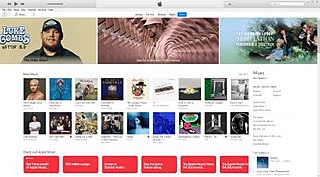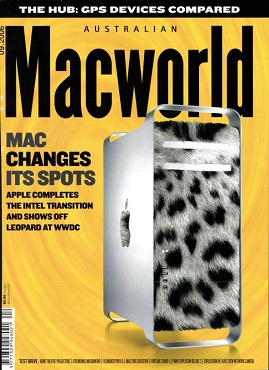
Quark Software Inc. is a privately owned software company which specializes in an integrated, single vendor solution for managing the entire content lifecycle, from content strategy and creation, through collaboration and publishing, to consumption and analysis. It offers low-code / no-code XML-based structured content authoring in Microsoft Word or a Web browser, component content storage and assembly via CCMS, and content intelligence based on AI and production, consumption and workflow analytics. It enables content reuse and is used for content automation in translation and localization workflows with its flexible content models and design templates.

Macworld is a digital magazine and website dedicated to products and software of Apple Inc., published by Foundry, a subsidiary of IDG.

The iTunes Store is a digital media store operated by Apple Inc. It opened on April 28, 2003, as a result of Steve Jobs' push to open a digital marketplace for music. As of April 2020, iTunes offered 60 million songs, 2.2 million apps, 25,000 TV shows, and 65,000 films. When it opened, it was the only legal digital catalog of music to offer songs from all five major record labels.
Macworld/iWorld was an information technology trade show with conference tracks dedicated to Apple's Mac platform. It was held annually in the United States during January. Originally Macworld Expo and then Macworld Conference & Exposition, the gathering dates back to 1985. The conference was organized by International Data Group (IDG), co-publisher of Macworld magazine.

MacCentral was a web site that provided news and information covering the Apple Macintosh, originally as an independent entity and later as the news service for Mac Publishing Web sites, including Macworld.com and Playlist, before being subsumed by Macworld's own brand.

iLife is a discontinued software suite for macOS and iOS developed by Apple Inc. It consists of various programs for media creation, organization, editing and publishing. At various times, it included: iTunes, iMovie, iPhoto, iDVD, iWeb, and GarageBand. Only iMovie and GarageBand remain and are now freely available on Apple's Mac App Store. iDVD and iWeb have been discontinued while iTunes and iPhoto have been succeeded by Music and Photos respectively.
Power Computing Corporation was the first company selected by Apple Inc to create Macintosh-compatible computers. Stephen “Steve” Kahng, a computer engineer best known for his design of the Leading Edge Model D, founded the company in November 1993. Power Computing started out with financial backing from Olivetti and Kahng.

Shake is a discontinued image compositing package used in the post-production industry developed by Nothing Real for Windows and later acquired by Apple Inc. Shake was widely used in visual effects and digital compositing for film, video and commercials. Shake exposed its node graph architecture graphically. It enabled complex image processing sequences to be designed through the connection of effects "nodes" in a graphical workflow interface. This type of compositing interface allowed great flexibility, including the ability to modify the parameters of an earlier image processing step "in context". Many other compositing packages, such as Blender, Blackmagic Fusion, Nuke and Cineon, also used a similar node-based approach.

International Data Group is a market intelligence and demand generation company focused on the technology industry. IDG, Inc.'s mission is centered around supporting the technology industry through research, data, marketing technology, and insights that help create and sustain relationships between businesses.

Stevenote is a colloquial term for keynote speeches given by Steve Jobs, former CEO of Apple, at events such as the Apple Worldwide Developers Conference, Macworld Expo, and Apple Expo. Because most Apple product releases were first shown to the public at these keynotes, "Stevenotes" caused substantial swings in Apple's stock price.
The Apple community is the users, media, and third party companies interested in Apple Inc. and its products. They discuss rumors, future products, news stories, and support of Apple's products. Apple has a cult-like following, especially for the Apple II, Macintosh, iPod, iPhone, and luminary staff members. The personal computer revolution, mixed with Apple's vertical integration of its products and services, has increased popularity. Apple's corporate policy of extreme secrecy about future products intensify interest in the company's activities.

Hotline Communications Limited (HCL) was a software company founded in 1997, based in Toronto, Canada, with employees also in the United States and Australia. Hotline Communications' main activity was the publishing and distribution of a multi-purpose client/server communication software product named Hotline Connect, informally called, simply, Hotline. Initially, Hotline Communications sought a wide audience for its products, and organizations as diverse as Avid Technology, Apple Computer Australia, and public high schools used Hotline. At its peak, Hotline received millions of dollars in venture capital funding, grew to employ more than fifty people, served millions of users, and won accolades at trade shows and in newspapers and computer magazines around the world.
MacTech is a monthly magazine for consultants, IT Pros, system administrators, software developers, and other technical users of the Apple Macintosh line of computers.

Macworld Australia was the Australian version of the Macworld brand and magazine, carrying a combination of licensed content from the US and UK publications. It was the longest running Apple magazine outside the USA: running from 1985 to 2018.

MacFormat is the UK's biggest computer magazine aimed at Macintosh users. It published 13 issues per year. It is published by Future plc, and has been since 1993.

MacRumors is an American website that reports and aggregates Apple Inc.- and Mac-related news, rumors, and information.
Tech Advisor, previously known as PC Advisor, is a consumer tech website and digital magazine published by Foundry, a subsidiary of International Data Group, which also produces Macworld, PC World and TechHive. IDG, Inc. was acquired by Blackstone in 2021.

MacTalk Australia was an online forum dedicated to news, support & discussion amongst Apple enthusiasts or potential users, with an Australian bias.
MobileMe is a discontinued subscription-based collection of online services and software offered by Apple Inc. All services were gradually transitioned to and eventually replaced by the free iCloud, and MobileMe ceased on June 30, 2012, with transfers to iCloud being available until July 31, 2012, or data being available for download until that date, when the site finally closed completely. On that date all data was deleted, and email addresses of accounts not transferred to iCloud were marked as unused.












